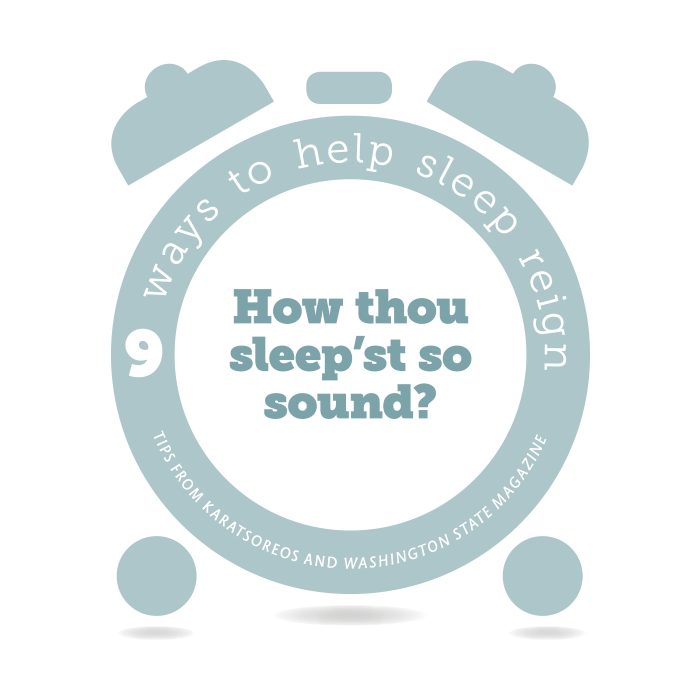If Shakespeare lived today, the playwright would surely be prescribed a sleep study. With his many references to sleep walking, apnea, insomnia, and nightmares, you can almost see the baggy-eyed bard sitting in his nightcap writing by candlelight.
“O sleep, gentle sleep! Nature’s soft nurse, how have I frighted thee, that thou no more wilt weigh my eyelids down?” he bemoans in Henry IV, Part 2.
It’s a familiar lament to all those who have lain awake yearning for sleep’s healing balm. But there the comparison ends.
While Shakespeare’s restless, seventeenth-century nights were lit with a single amber flame, today’s insomniacs are usually staring at bright blue LED screens in a world increasingly devoid of darkness.
From streetlights to nightlights, light pollution is taking a toll on peaceful slumber in modern societies all over the world, says Ilia Karatsoreos, associate professor in the Department of Integrative Physiology and Neuroscience at Washington State University.
Karatsoreos studies the circadian timing system—an exquisite network of internal clocks that keeps our physiology running smoothly throughout the 24-hour light/dark cycle.
The system is governed by a light-sensitive master clock located in the suprachiasmatic nucleus (SCN) in the hypothalamus. This tiny timekeeper receives input through the eyes which is relayed to various brain centers and peripheral clocks in the heart, lungs, liver, and other organs. Together, they control everything from behavior, hormone levels, and metabolism to body temperature and sleep.
“We have special cells in the retina that are very sensitive to blue-rich light, which is essentially a signal for dawn and time to wake up,” says Karatsoreos. Unlike the rods and cones that provide vision, these photoreceptors regulate the sleep cycle through a direct line to the SCN.
Light also travels indirectly to the pineal gland which secretes the sleep-promoting hormone melatonin. As light diminishes and becomes more yellow late in the day, melatonin levels rise to prepare us for bed. That release can be delayed, however, by even brief exposure to artificial light.
While Shakespeare’s nights consisted of first and second sleeps separated by peaceful moonlit “watches,” Karatsoreos says using blue light-emitting e-readers or cellphones in the wee hours sends a jarring wake-up signal that can disrupt sleep patterns for the rest of the night.
As a member of the Sleep and Performance Research Center at WSU Spokane, Karatsoreos is investigating how that disruption impacts our physical and mental health. He explores questions like, “What happens to the liver if you change the light/dark cycle and how does that affect metabolism?”
To find out, he studies mice who live in a shortened 20-hour day. Through EEG readings, Karatsoreos discovered that although they sleep the same amount of time as control mice, the quality of their sleep is poor.
“Their deep, slow wave sleep was reduced, which we think is the most restorative stage of sleep,” he says. “It was also more fragmented—and they sleep in shorter bouts than normal.”
In a recent project, Karatsoreos found that mice with disrupted sleep cycles also gained weight despite eating the same amount of food. Additionally, they showed impaired cognitive flexibility and problems with working memory. The mice had trouble changing tactics, for example, or remembering short-term information—similar to memorizing a phone number long enough to make the call.
His research even suggests that repeated sleep disruption might accelerate aging—an idea hard to dispute when you trudge to the bathroom and look in the mirror after a rough night tossing and turning.
“Oh, sleep that knits up the raveled sleeve of care…,” writes Shakespeare in Macbeth. Indeed, the sleep-deprived poet understood the value of quality rest.
And, though sleep as a whole remains a mystery—Karatsoreos says no one knows exactly why we do it—it’s clear that 7–9 hours of serene slumber can set the stage for a healthy and productive life, the kind that dreams are made on.
Improve sleep hygiene: Turn off extraneous lights. Use blackout curtains. Keep your bedroom cool and quiet.
Night-lights, if needed, should be dim, low to the ground, and of a golden hue.
Install Night Shift or F.Lux on your digital devices. The app slowly shifts screen color from blue during the day to a more calming orange tint at night. Better yet, just turn them off.
Adopt a relaxing bedtime routine: Avoid work, reading thrillers, or watching action movies in bed.
A walk at night is relaxing but avoid heavy exercise 3–4 hours before sleep.
Reduce Social Jet Lag: Try to stick to a sleep schedule even on weekends.
Reduce caffeine intake and avoid heavy meals several hours before sleep.
Ditch the alarm clock: Try a dawn/dusk simulator such as the Philips Somneo.
To help ease Seasonal Affective Depression: Try the Verilux HappyLight or Philips GOLite BLU in the morning to brighten your mood and improve sleep.
Read about the human microbiome and sleep.

